|
|
|
Sort Order |
|
|
|
Items / Page
|
|
|
|
|
|
|
| Srl | Item |
| 1 |
ID:
166807


|
|
|
|
|
| Summary/Abstract |
This article analyzes and compares four results of public opinion surveys conducted through the coordination of academic institutions in Thailand's Deep South. Based on the concepts of the conflict transformation, the study indicates, in the survey data conducted from 2015 to 2017, that people in the Deep South have had mixed feelings about the ongoing peace talks and the violent situation. The more open form of autonomous governance has been advocated by a sizable number of people, but the spiral of silence dominating the “no comment” groups still makes it problematic to predict the future. More studies need to be done and the article also shows that the survey research, if carried out properly, could reveal the unseen drivers of change in the conflict society.
|
|
|
|
|
|
|
|
|
|
|
|
|
|
|
|
| 2 |
ID:
166804
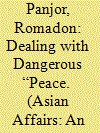

|
|
|
|
|
| Summary/Abstract |
The deadly ethno-political conflict in the Deep South of Thailand or “Patani” corresponds with problematic issues regarding the presence or absence of certain terminology. In other words, the naming of violent situations, actors, the territory/land and the people, including the way in which these conflicts have been transformed, remains contested. This chapter elaborates upon the semantic dynamic of such naming by means of “unfolding” to present times how these contested words and concepts could shape conflict and the peace process and how peace communities should deal with confronting the political convenience of accepting a term such as “armed conflict” and the difference between Thai terms such as “santipap” and “santisuk” which both seem to mean “peace” in this conflict.
|
|
|
|
|
|
|
|
|
|
|
|
|
|
|
|
| 3 |
ID:
166809
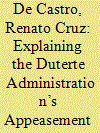

|
|
|
|
|
| Summary/Abstract |
This article examines the reason behind the dramatic shift in Philippine foreign policy under the Duterte Administration. His predecessor, president Benigno Aquino, vigorously challenged China’s expansive territorial claim in the South China Sea throughout his six-year term. However, president Rodrigo Duterte’s actions and pronouncements are undoing the former president’s geopolitical agenda of balancing China’s expansion in the disputed waters. He distances the Philippines from the United States, its long-standing treaty ally, and gravitates toward China. This stance aims to earn goodwill with China so that the Philippines can avail itself of enormous aids and loans from China’s Belt and Road Initiative (BRI). This stemmed from this administration’s fear that the Philippines would not benefit from China’s emergence as an economic power. Nevertheless, by appeasing an expansionist power, the Philippines becomes complicit to China’s long-term strategy of maritime expansion to push the United States out of East Asia. In conclusion, the article warns that the Duterte Administration might end up losing the country’s exclusive economic zone (EEZ) in the South China Sea and the confidence and trust of its allies and security partners. This administration might also leave the public coffers empty and dry because of China’s reneging on its commitment to fund the Philippines’ massive infrastructure-building program, labeled “Build, Build, and Build.”
|
|
|
|
|
|
|
|
|
|
|
|
|
|
|
|
| 4 |
ID:
166802
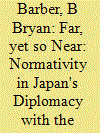

|
|
|
|
|
| Summary/Abstract |
Japan has been playing a steady and pivotal role in Central Asia since the fall of the Soviet Union, but to presume Tokyo's engagement is predicted on strategic interests that compete with other powers such as Russia and China in the so-called “New Great Game” is naïve to the activities occurring on the ground. Newly independent and largely unaffected by Japanese past aggression, the five Central Asian states present a unique “petri dish” for Japan's values-based diplomacy in Asia. This study analyzes significant Japanese foreign policy measures with the Central Asian republics since independence, and—through examination of speech acts by the political elites, practices on the ground, and within the institutional framework of the Central Asia Plus Japan dialogue—draws out the normativity evident in Tokyo's Central Asian policy. Using a symbiotic framework for foreign policy analysis of geopolitics, geo-economics, and geoculture, this study isolates geoculture from the two other dynamics in order to illustrate how norms operate independently from strategic interests in the region.
|
|
|
|
|
|
|
|
|
|
|
|
|
|
|
|
| 5 |
ID:
166806


|
|
|
|
|
| Summary/Abstract |
Migration by nature can lead to1 integration. This is possible when a nation-state takes a clear stand on the practices of multiculturalism. Most Asian countries have failed to adopt multiculturalism and rather practice the policy of assimilation. Yet multiculturalism has become popular as this concept incorporates recognition of ethnic and national minorities and supports their cultural identity. Due to longstanding conflict in the southernmost provinces of Thailand, various data suggests that many Malay-Muslims migrated to the upper southern provinces of Thailand in recent years. In this context, internal migration occurred mainly for economic as well as security reasons. Consequently, in some provinces demographic numbers have changed. In the near future, there may be changes in Thai society, especially in the upper southern provinces. The main purpose of this study is to ascertain how the government accommodates internal migration especially in upper southern provinces. In order to develop a multicultural society, the Thai government should nurture minority issues in various ways. Apart from the government, Thai civil society—comprising academics and NGOS—has addressed it from their own perspectives. Still, there is no comprehensive approach to deal with this issue. Aside from the lack of cultural and political integration, Thai society may face severe related challenges to migration in the next decade.
|
|
|
|
|
|
|
|
|
|
|
|
|
|
|
|
| 6 |
ID:
166805
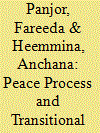

|
|
|
|
|
| Summary/Abstract |
The objective of this study is to understand the linkage between peace processes and transitional justice in armed conflict areas, comparing three experiences from Mindanao (the Philippines), Colombia, and Thailand’s Deep South in the implementation of transitional justice (TJ). The study found that the substantial success of conflict transformation in the Mindanao and Colombia peace processes resulted from balancing and emphasizing human rights and peace processes by applying significant transitional justice innovations at the implementation stage. Although the peace processes in Mindanao and Colombia evolved prior to 1996 and 1990, respectively, the peace process in Thailand’s Deep South commenced more recently, in 2013. Despite the time differences, this study helps us understand the relevance and importance of peace processes and transitional justice from each country, providing lessons for the progress of the peace process in Thailand’s Deep South.
|
|
|
|
|
|
|
|
|
|
|
|
|
|
|
|
| 7 |
ID:
166808


|
|
|
|
|
| Summary/Abstract |
The Tatmadaw (the Myanmar armed forces) and the Royal Thai Armed Forces (RTAF) are two of the most resilient and enduring politically active militaries in the world, engaging in a decades long process of the institutionalization of a system of military tutelage. There are, however, significant differences in the strategies pursued and the degree of success achieved in each. These variations are due to the combination of three factors creating the environmental context within which they have pursued these projects: (1) the existence of political allies and cohesiveness of the military; (2) degree of unification of domestic opposition elements against them; and (3) international pressures and influences. Based on a Historical Institutionalist perspective, this paper will map the interplay of these factors over time within each case to explain the different pathways these projects have proceeded. With a lack of allies, a fragmented opposition, and various degrees of international pressure the Tatmadaw has been unsuccessful in creating a durable system of tutelage, resulting in lengthy periods of direct rule while attempting wholesale recreations of the state. In Thailand, the RTAF’s alliance with the Monarchy combined with a fragmented but at times united opposition and weak international pressure has resulted in frequent coups to remove elected governments, but usually for short durations resulting in their limited institutionalization into the political system. The current democracy projects in both states, in part due to domestic and international pressures, are not about replacing but rather embedding the military’s involvement in the political system, though their freedom of action has been constrained to a certain extent. Myanmar and Thailand are best characterized as perpetual transitions as an intentional project to maintain a defective-democratic, tutelary system. Defective in that the military maintains the prerogative to involve itself in electoral politics and tutelary in that the military has cordoned off reserve domains of policy which ensure the system, regardless of who is in charge, supports their interests.
|
|
|
|
|
|
|
|
|
|
|
|
|
|
|
|
| 8 |
ID:
166803


|
|
|
|
|
| Summary/Abstract |
In a geographical area termed “Patani” by local Malay-Muslims, or what the Thai state refers to as its southernmost region, 2019 sees continuing insurrection—matched by state counter-insurgency—entering its 15th year. This Special Issue of Asian Affairs: An American Review elaborates upon the continuing strife, as well as related aspects of it. The articles in this Special Issue originate from a Toyota Foundation project entitled “Locating Peace through Diversity: The Cases of Thailand’s Deep South and Indonesia’s Aceh Province.”1
|
|
|
|
|
|
|
|
|
|
|
|
|
|
|
|
| 9 |
ID:
166801
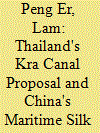

|
|
|
|
|
| Summary/Abstract |
China today has the interest, money and technology to build the Kra Canal in Southern Thailand consonant to Chinese President Xi Jinping's grand strategy of a Maritime Silk Road. Notwithstanding China's rise and friendly relations with Thailand, the Kra Canal project has stalled due to gridlock in Thai domestic politics. Beijing cannot simply impose its infrastructural preferences on Bangkok but needs the latter's consent. Thus far, that consent is not forthcoming. But if the construction of the Canal were to proceed ahead unexpectedly and quickly, it could be a navigational, trading and geopolitical game changer upon completion in Southeast Asia.
|
|
|
|
|
|
|
|
|
|
|
|
|
|
|
|
|
|
|
|
|